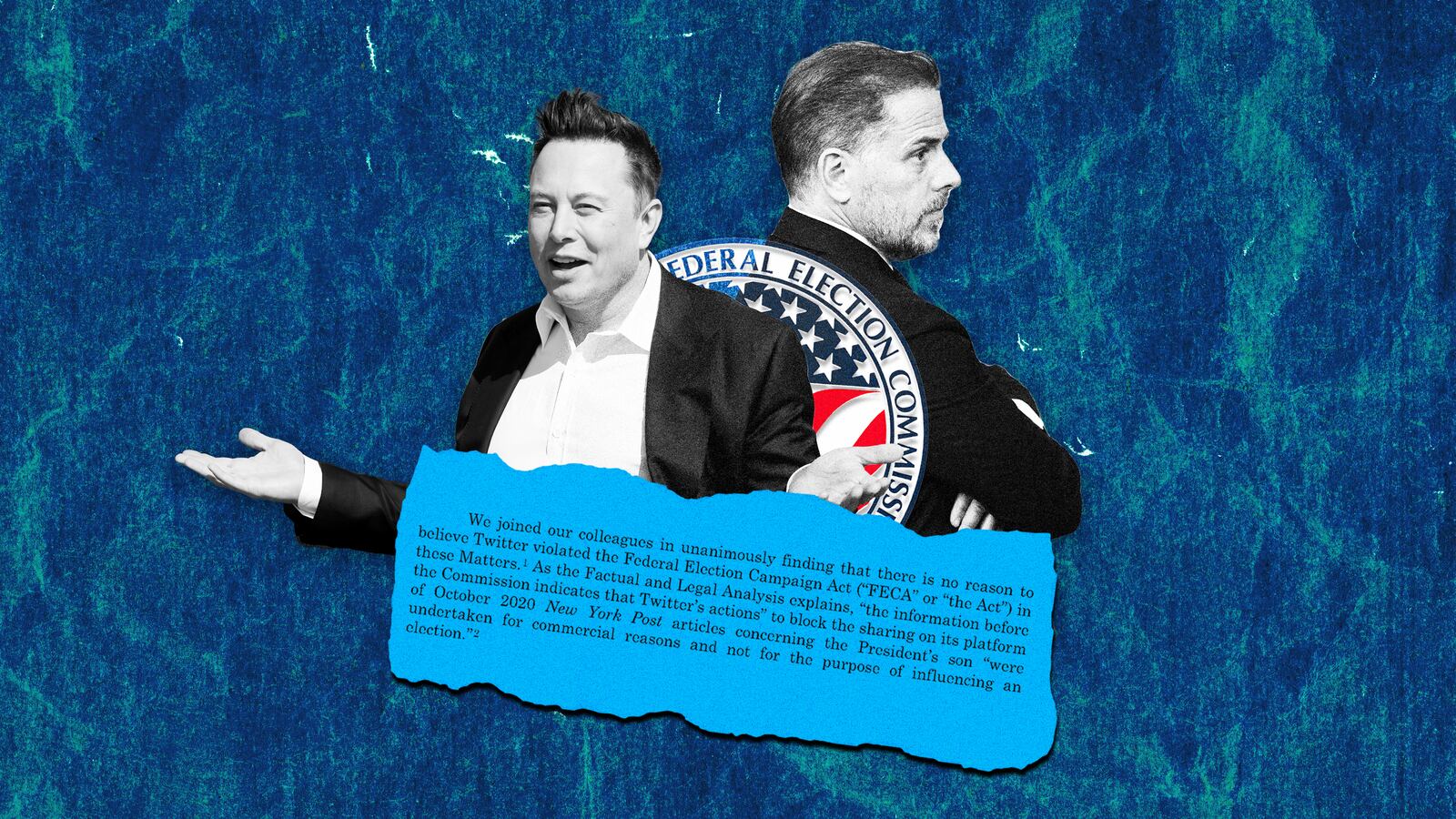Pay Dirt is a weekly foray into the pigpen of political funding. Subscribe here to get it in your inbox every Thursday.
As conservatives re-up their criticism of Twitter for supposedly interfering in the 2020 election with its two-day ban on an unverified story about Hunter Biden’s laptop, it’s worth noting that Republican federal election officials already cleared the company of that specific charge.
Last Friday night, Twitter CEO Elon Musk released “the Twitter Files,” a behind-the-scenes account of the social media giant’s controversial decision in the run-up to the 2020 election to temporarily restrict circulation of the New York Post’s unconfirmed report about the contents of a laptop hard drive supposedly belonging to Hunter Biden.
The platform reversed its decision in two days. But in that time, Twitter—citing company policy of restricting the spread of “hacked materials”—blocked all sharing of the story, and locked the New York Post out of its account.
The Twitter Files took the form of a 37-tweet thread from independent Substack journalist Matt Taibbi, with Musk, who officially took over the company last month, pumping it as an “awesome” exposé of political bias and malfeasance under the tech firm’s old management.
The so-called “bombshell” landed with a thud. Multiple news and tech outlets—and even some Republicans—panned the story as overhyped and ultimately empty. And, it turns out, FEC Republicans would appear to agree.
Agency investigators, acting on a complaint from the Republican National Committee, took up the issue as it pertains to campaign finance law—whether Twitter’s actions constituted an unlawful in-kind contribution to the Biden campaign.
And while the commissioners often disagree on these matters, there was little conflict here. Last year, they voted 6-0 to dismiss the complaint, which the RNC had filed Oct. 16, 2020—two days after the laptop story broke, and the same day Twitter reversed its decision.
The agency exonerated Twitter, with two GOP commissioners releasing a statement saying that the company had not acted with “the purpose of influencing an election.”
A year later, Taibbi’s thread garnered much the same reaction. While the story was celebrated in some corners of the right, it was “not really the smoking gun” some were hoping for, as New York Post columnist Miranda Devine told Fox News’ Tucker Carlson.

Matt Taibbi on Oct. 31, 2017 in New York City.
Daniel Zuchnik/WireImage/Getty ImagesBut Taibbi did shine some light on the inner workings of the company during the first tumultuous days after the Post’s unverified report.
His thread shows that Twitter officials engaged in earnest debate about the decision, citing concerns about whether the laptop contents might violate its policy against publishing “hacked materials.” (Conservative-leaning outlets such as The Wall Street Journal and Fox News had passed on the laptop story, pointing to sourcing concerns; even some journalists at the New York Post turned it down.)
Citing internal records, Taibbi also revealed that during the 2020 campaign, both the Donald Trump White House and Joe Biden’s campaign availed themselves of direct channels to Twitter support to file take-down requests for posts that allegedly violated the site’s terms, and that requests from both were “received and honored.”
The Biden requests Taibbi provided almost all involved racy photos, including pictures of his son’s penis, which violated the site’s policies on pornographic material. However, Taibbi didn’t provide parallel examples from the Trump White House, which, as a government authority at the time, would raise more questions about First Amendment concerns than requests from a non-incumbent challenger.
At one point Taibbi implied that Democrats benefited more from these connections because political donations from Twitter employees have favored Democrats, but he did not provide internal documentation to substantiate the suggestion that the company had actually acted with partisan intent.
Still, many elected Republicans—who have complained about the decision for more than two years without gaining much traction outside of their party—seized the moment.
For example, multiple congressional leadership accounts raised alarms of “collusion,” and the GOP head of the Oversight Committee condemned the revelations as evidence of “election suppression.” Prominent Republicans like freshman Reps. Marjorie Taylor Greene (R-GA) and Lauren Boebert (R-CO) called for investigations.
Musk also weighed in. In a live Twitter roundtable over the weekend, the new Twitter chief, who endorsed Republican candidates for the 2022 midterms, implied that the decisions surrounding the report were “the very definition of election interference.” Twitter, Musk said, had acted “like an arm of the Democratic National Committee.”
“It’s absurd,” he said.
But last year, Republicans on the Federal Election Commission—no strangers to accusations of partisanship themselves—shot down those same accusations.
Instead, FEC investigators found that Twitter did not act with an intent to interfere with the election or tilt the scales towards Biden. According to the statement of reasons from two Republican commissioners, Twitter’s decisions at the time “were undertaken for commercial reasons and not for the purpose of influencing an election.”
Brendan Fischer, deputy executive director of government watchdog Documented, told The Daily Beast that the Twitter Files “don’t change the analysis.”

Twitter headquarters in downtown San Francisco, California, on Nov. 4, 2022.
Nathan Frandino/Reuters“Twitter has acknowledged that the decision to suppress the Hunter Biden laptop story was a mistake, but even conservative members of the FEC agree that it wasn’t a campaign finance violation,” Fischer said.
“The ‘Twitter Files’ released thus far don’t change the analysis,” he added. “The messages show internal deliberation about how to handle an unconfirmed news report based on data from a stolen laptop, but they do not appear to show any sort of intent to influence the election or tilt it towards Biden.”
The FEC agreed—with one dissenting GOP commissioner, former Sen. Josh Hawley (R-MO) chief of staff Sean Cooksey, writing that he was “not so sure” Twitter was not trying to influence the election.
But Cooksey still voted to dismiss the RNC’s allegations, arguing in a standalone statement that Twitter, in his analysis, acts as a publisher and is therefore entitled to the law’s media exemption. (Hawley, who Cooksey still served at the time of the New York Post report, has also long argued that Twitter is a publisher, a pretext for stripping other legal immunities the website enjoys as a social media platform.)

President Joe Biden waves alongside his son Hunter Biden after attending mass at Holy Spirit Catholic Church in Johns Island, South Carolina on Aug. 13, 2022.
Nicholas Kamm/AFP via Getty Images“In my view, the record doesn’t establish whether Twitter was consistently enforcing a politically neutral business policy or using its platform to support one candidate over another,” Cooksey wrote.
That “not so sure” remark was as close as these Republicans came to meeting the right-wing histrionics in response to Taibbi’s tweets.
At one point, Musk—who over the last year has openly courted Republicans and far-right ideologues—wrote, “if this isn’t a violation of the Constitution’s First Amendment, what is?”
While acknowledging that Twitter’s status as a private company puts it beyond the scope of the First Amendment, Musk added that “acting under orders from the government to suppress free speech, with no judicial review,” would violate the Constitution. He did not, however, apply that logic to Twitter acting on takedown requests from the White House while Trump was president.
But the FEC’s general counsel reported that the move was purely corporate, “in accordance with Twitter’s pre-existing content policies.”
Further, the report said, Twitter enacted that policy in the interest of “the protection of its brand and its ability to attract advertisers—i.e., its ‘commercial viability.’”
That report came more than a year before Musk bought Twitter for $44 billion. In the month since the takeover, he has taken controversial steps to deregulate content moderation on the platform in the interest of “free speech,” giving rise to a spike in racist and antisemitic posts.
Ironically, Musk’s ideological pivot had the opposite effect of the policies the FEC had evaluated a year earlier—it sent advertisers running for the exits.










